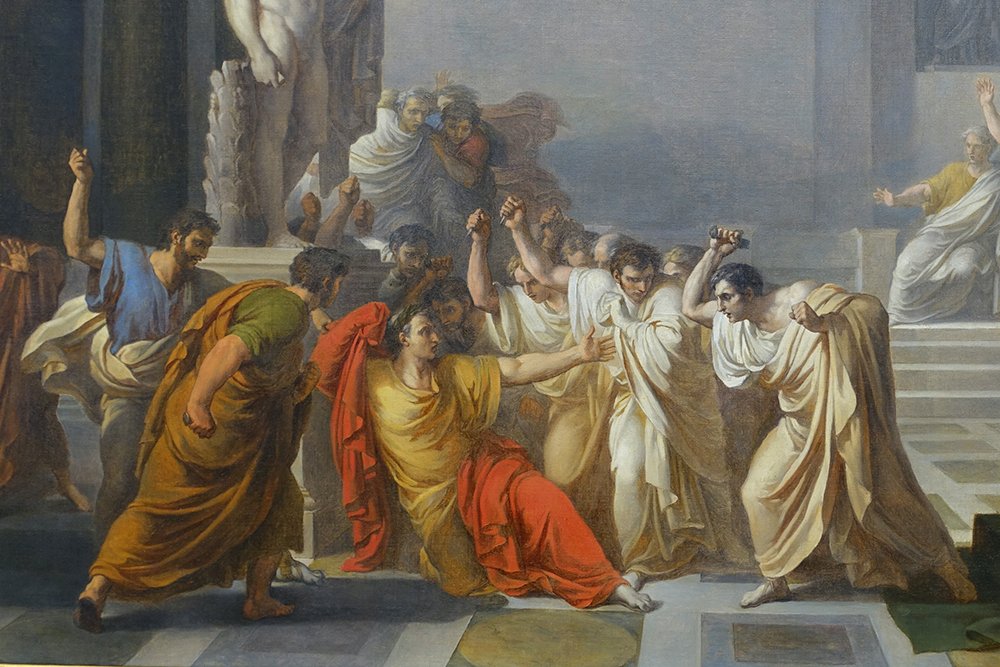
The Assassination of Julius Caesar
In the annals of history, few events have reverberated with such seismic impact as the assassination of Julius Caesar. On the Ides of March in 44 BCE, the Roman dictator fell victim to a conspiracy orchestrated by senators who perceived his growing power as a threat to the Republic. The assassination not only ended the life of one of Rome's most influential leaders but also marked the beginning of the end for the Roman Republic, paving the way for the rise of the Roman Empire under the rule of Caesar's adopted heir, Octavian, later known as Augustus.
The Rise of Julius Caesar:
To understand the significance of Caesar's assassination, one must first grasp the context of his rise to power. Born into a patrician family in 100 BCE, Julius Caesar ascended through the ranks of Roman politics with unparalleled ambition and strategic brilliance. His military conquests, particularly in Gaul, solidified his reputation as a formidable general and earned him unwavering loyalty from his troops.
In 49 BCE, Caesar famously crossed the Rubicon River with his army, defying the Senate's authority and igniting a civil war against his rival, Pompey the Great. Emerging victorious, Caesar assumed the role of dictator, effectively wielding absolute power over Rome. However, his consolidation of authority aroused deep-seated fears among the senatorial elite, who viewed him as a tyrant in the making.
The Conspiracy Against Caesar:
The plot to assassinate Julius Caesar took shape among a group of disgruntled senators, led by figures such as Gaius Cassius Longinus and Marcus Junius Brutus. Despite their personal grievances and ideological differences, these conspirators shared a common goal: to safeguard the traditional institutions of the Republic by eliminating the perceived threat posed by Caesar's unchecked authority.
On the fateful day of March 15, 44 BCE, Caesar attended a meeting of the Senate at the Theatre of Pompey. Unbeknownst to him, many of the senators present harbored murderous intent. As Caesar took his seat, the conspirators surrounded him, brandishing concealed daggers. In a frenzied onslaught, they descended upon Caesar, stabbing him repeatedly until his life ebbed away. The assassination sent shockwaves throughout Rome, plunging the city into chaos and uncertainty.
The Aftermath and Legacy:
While the assassination of Julius Caesar achieved its immediate objective of removing a perceived despot, it ultimately failed to restore the crumbling foundations of the Republic. Instead, it unleashed a power struggle that culminated in a series of civil wars, ultimately leading to the rise of Caesar's grandnephew and designated heir, Octavian, as the undisputed ruler of Rome.
Under the guise of preserving the Republic, Octavian, later known as Augustus, ushered in a new era of autocratic rule, effectively transforming Rome into an imperial state. The assassination of Julius Caesar thus inadvertently paved the way for the ascendancy of the Roman Empire, marking a profound shift in the course of Western civilization.
The Betrayal of Brutus:
Among the conspirators, Marcus Junius Brutus stands out as a figure of particular intrigue and controversy. As a descendant of the revered statesman Lucius Junius Brutus, who played a pivotal role in overthrowing the Roman monarchy, Brutus was widely regarded as a champion of republican virtue. His decision to betray Caesar, his mentor and benefactor, has sparked centuries of debate over his motives and allegiances.
In Shakespeare's immortalized rendition of Caesar's assassination, Caesar delivers the infamous line, "Et tu, Brute?" ("And you, Brutus?"), capturing the moment of his realization that even his closest allies had turned against him. Whether driven by genuine concern for the Republic or personal ambition, Brutus's role in the conspiracy has left an indelible mark on the historical narrative of Caesar's demise.
Conspiracy Theories and Historical Interpretations:
The assassination of Julius Caesar has fascinated historians and scholars for centuries, spawning a myriad of interpretations and conspiracy theories. Some contend that Caesar's assassination was a noble act of patriotism, intended to preserve the principles of the Republic against tyranny. Others view it as a cynical power grab orchestrated by rival factions vying for control of Rome's destiny.
One theory posits that Caesar himself may have anticipated the plot against him but chose to attend the Senate meeting regardless, perhaps out of hubris or a fatalistic acceptance of his fate. Regardless of the true motivations behind the assassination, its enduring legacy serves as a cautionary tale about the perils of unchecked ambition and the fragility of political institutions.
Conclusion:
The assassination of Julius Caesar stands as a pivotal moment in the annals of ancient history, marking the end of the Roman Republic and the dawn of the Roman Empire. Driven by a potent mix of political intrigue, personal ambition, and ideological fervor, the conspiracy against Caesar reverberated far beyond the confines of the Senate chamber, reshaping the course of Western civilization for centuries to come. As we reflect on this momentous event, we are reminded of the enduring lessons it imparts about the nature of power, the fragility of democracy, and the inexorable march of history.








